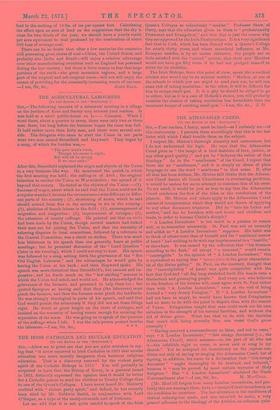THE AGRICULTURAL LABOURERS.
[TO THE EDITOR OF THE " SPECTATOR."] SIR,—The following account of a labourers' meeting in a village on the borders of Kent and Surrey may interest your readers. It was held at a small public-house on L— Common. When I went there, about a quarter to seven, there were only two or three men there, but long before the business began the room was full.
It held rather more than forty men, and there were several out- side. The delegates who came to start the Union in our parts were two men named Streatfield and Hayward. They began by a song, of which the burden was,-
" The poor man's weak, Though his cause is right;
But will all be strong, If we once unite."
After this, Streatfield explained the origin and objects of the Union in a very business-like way. He mentioned the parish in which the first meeting was held ; the calling-in of Arch ; the original intention to confine the Union to Warwickshire ; the spread of it beyond that county. Ile stated as the objects of the Union :—(I), Increase of wages, about which he said that the Union could not fix angular standard, because the circumstances were different in differ- ent parts of the country ; (2), shortening of hours, which he said Should extend from five in the morning to six in the evening ; (3), abolition of female labour in the field ; (4), encouragement of migration and emigration; (5), improvement of cottages ; (6), the extension of county suffrage. He pointed out that no strike bad been made by the Union, though several masters had locked their men out for joining the Union, and that the necessity of referring disputes to local committees, followed by a referenCe to the Central Committee, was a check on strikes. There was much less bitterness in his speech than one generally hears at public meetings ; but he promised discussion of the " Land Question " dater in the evening), which I could not stay to hear. His speech was followed by a song, setting forth the grievances of the " fine 'Old English Labourer," and the advantages he would gain by baying the Union at his back ; and then Hayward spoke. His speech was more rhetorical than Streatfield's, but earnest and im- pressive; and he dwelt much on the " law-abiding " manner in which the Union had acted, and would act. He acknowledged the grievances of the farmers, and promised to help them too ; but quoted Spurgeon as having said that they (the labourers) must pinch the farmers, and then the farmers must pinch the landlords. He was strongly theological in parts of his speech, and said that God would punish the aristocracy if they did not set these things right. He• dwelt at great length on the state of cottages, and insisted on the necessity of having rooms enough for securing the separation of the sexes. He was going on to speak of the question of the suffrage when I left. I was the only person present besides 'the labourers.—I am, Sir, &c., * *


































 Previous page
Previous page